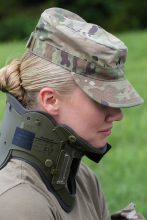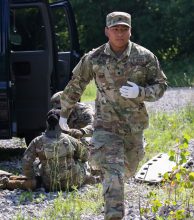FORT KNOX, Ky.- What is the key to success when performing a mass casualty evacuation? That’s right, communication! As cliché as it might sound, communication is the most vital tool to use when working to assess a situation.
The Cadre at Forward Operating Base Densberger were preparing for the imminent arrival of 9,000 cadets for Cadet Summer Training.

Cadre prepared for Cadet Summer Training, CST, 2018 by rehearsing a casualty evacuation. Photo by: Madison Thompson
“This is the Densberger Scenario. There was a vehicle accident down the hill and our medics will go respond to it and document the care as quickly as possible,” briefed Cpt. Erin Kornaki. “Once on scene, we will then triage the victims or figure out which victim needs the most emergent care first. From there the victims will be transported to the Tactical Operations Center where they will be treated accordingly.”
In an event such as this, there are many moving parts and roles are constantly changing, to prepare for. The Cadre take additional classes, train the medics, and attend non-commissioned officer training. In other words, their leaders come together and talk through what needs to be done. After that is completed, the Cadre step into the field and run different scenarios as if they are happening in real life.

Cadre prepared for Cadet Summer Training, CST, 2018 by rehearsing a casualty evacuation. Specialist Joel Trejo assists in treatment and transportation during the casualty evacuation. Photo by: gMadison Thompson
It is crucial that everyone knows their role and the importance to remain on the same page throughout the exercise. In fact, when asked what key things will be emphasized throughout the exercise Kornaki responded with, “we’re really harping on communication. If we’re not talking to each other things can go bad really quickly. Our people need to know how to talk on the radio, talk to the right channels and people so that we can get the right assets coordinated to what we need.”
When reflecting on what changes can be made from past experiences, Spc. Joel Trejo gave a few words of advice for future Cadre. “Communicate. Even if you don’t know what you’re doing. Any communication you can give to those coming in to help you is good.”
The Cadre executed the exercise using effective communications skills and as a result the victims were found and treated in a timely manner. As you have probably heard it before communication is key, especially in a high priority situation.




